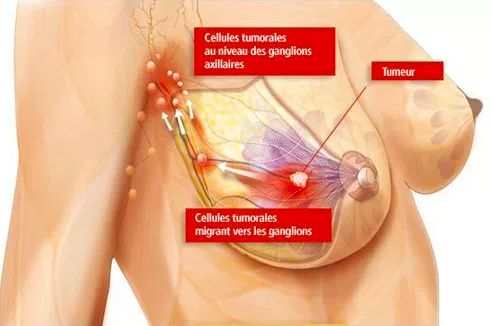Breast cancer
Dr. Velemir completed his training in breast surgery at the Jean Perrin Anti Cancer Center in Clermont Ferrand
Breast cancer

Dr Velemir has conducted training in breast surgery in the Centre Anti Cancer Jean Perrin in Clermont Ferrand. He favours techniques allowing an optimal aesthetic and functional result to limit the impact of surgery on his patients’ quality of life. He works with a team of specialists in radiology, senology, radiotherapy, oncology and psychology to offer his patients multidisciplinary case management which meets with quality standards in oncology and is very human at the same time
Breast cancer remains the most common female cancer
Breast cancer remains the most common cancer in women. It is estimated that one in nine women will be affected by this disease in her lifetime.
However, depending on the woman’s personal and family history, it may be recommended to begin screening at age 40, or sometimes younger, using mammography, breast ultrasound or breast MRI.
Advances in both general and targeted screening technology can lead to a diagnosis at an ever earlier stage, and this improves patient survival, which is currently 86% at 5 years, when all types of breast cancer are considered.
Breast cancer diagnosis is usually based on biopsy (removal) of a palpable nodule or of a suspicious area identified from imaging.
Apart from a few, exceptional cases, surgery remains the essential first step. Oncoplastic techniques (cosmetic surgery applied to oncology) allow only the tumour to be removed, saving the breast in 70% of cases.
If the total removal of the breast is unavoidable (total mastectomy), reconstruction techniques may be considered, after the surgery or sometimes during the operation.
Another important advance is the “sentinel node” technique.
It consists in removing the lymph node(s) (a part of the immune system in the shape of a small ball) that are closest to the tumour, in the hollow of the armpit. These nodes are analysed to see if they contain cancer cells, indicating that the tumour has started to spread. If it hasn’t spread to the lymph nodes, then the surgical procedure stops there. If the lymph nodes are involved, a lymph node dissection is performed: all nodes in the armpit are removed.
The removed tumour is subjected to a detailed analysis that allows future treatments to be tailored to the needs of the patient. These treatments could include: radiotherapy, hormone therapy, and/or chemotherapy.








